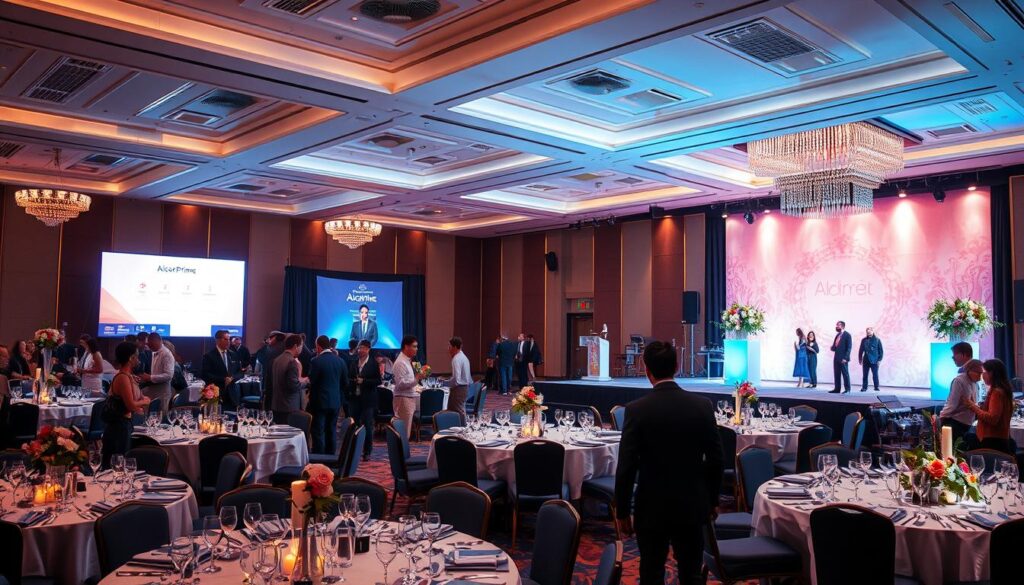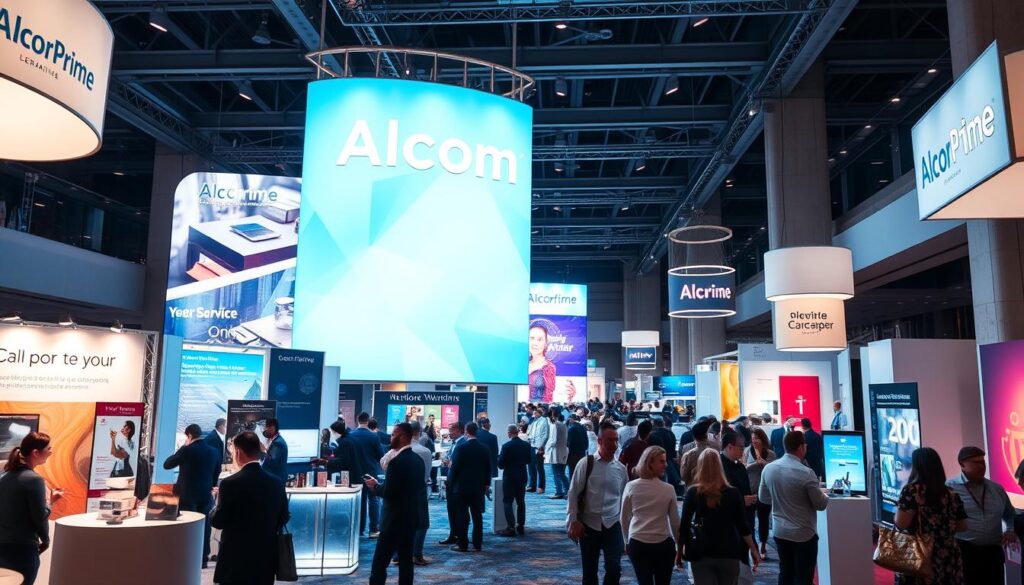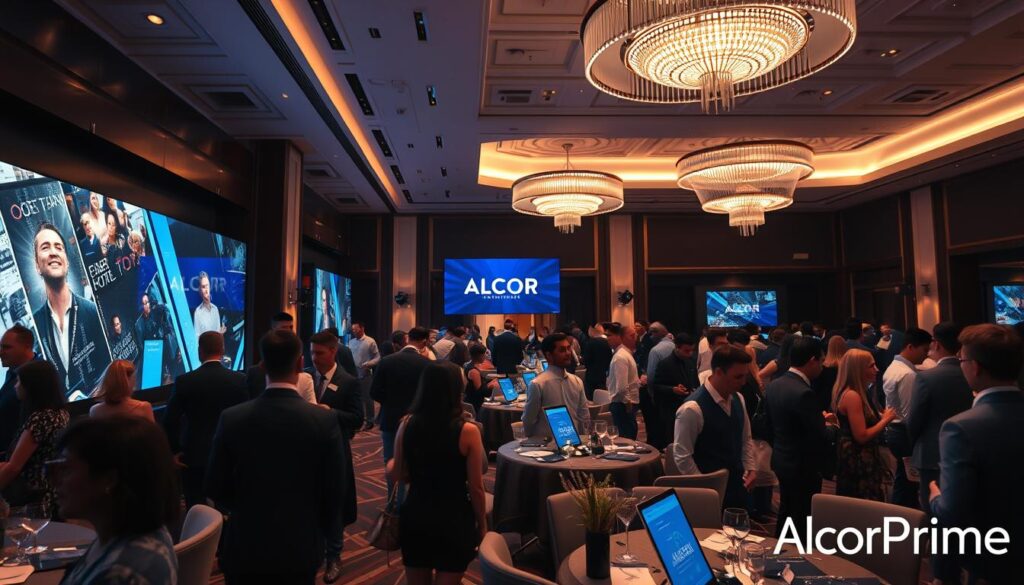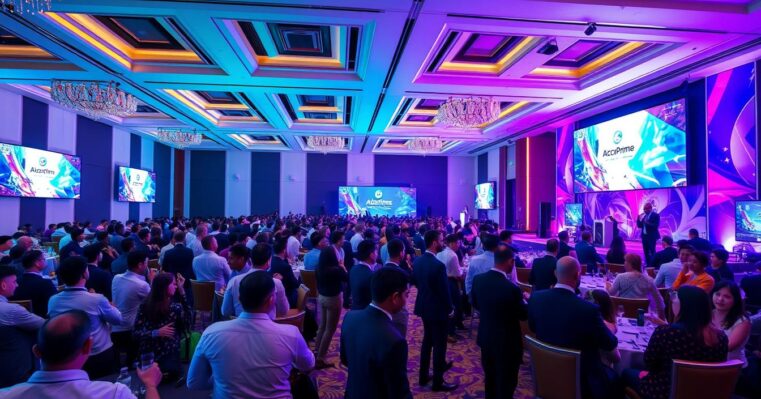Business event marketing is changing fast. A big question is: why do in-person events matter so much? They are seen as the most impactful by 80.4% of businesses1. And 48% of marketing teams say events are more vital now than before the pandemic1. We focus on making our clients' events stand out, offering top-notch service and expertise.
Good event planning and marketing can change the game for businesses. It lets them connect with people and make lasting memories. This is key for Marketing for Corporate Events and business event marketing. By understanding the value of in-person events, we help our clients reach their marketing goals.
Key Takeaways
- 80.4% of businesses consider in-person events as their most impactful marketing channel1.
- 48% of marketing teams state that events are more important now than before the pandemic1.
- Marketing for Corporate Events and business event marketing are crucial for building brand awareness and fostering relationships.
- Event planning and marketing can help businesses connect with their audience on a personal level and create memorable experiences.
- Understanding target audiences' preferences and values is essential for successful event marketing2.
- Effective event marketing can lead to a 23% increase in event attendance and increase brand recognition by up to 80%3.
- Marketing for Corporate Events and business event marketing should focus on community engagement and trust, rather than traditional sales-driven approaches2.
Understanding Corporate Event Marketing
Corporate event marketing is key to reaching business goals. It helps businesses make a lasting impression and meet their targets. Effective branding is also vital for standing out from competitors.
Corporate events aim to generate leads, boost brand awareness, and engage customers. Businesses use various strategies, like multi-touch promotion, to increase event visibility and attendance4. Social media engagement can also spark interest and boost attendance4.
Event marketing can lead to 50% higher engagement rates than traditional methods5. Also, 70% of marketers find live events the best for generating leads5. By focusing on event promotion and strategies, businesses can build loyalty, drive sales, and meet their objectives.
| Event Marketing Benefits | Statistics |
|---|---|
| Engagement Rate | 50% higher than traditional marketing methods5 |
| Lead Generation | 70% of marketers consider live events the most effective channel5 |
| Brand Loyalty | 86% of consumers are willing to pay more for better customer experience5 |
Identifying Your Target Audience
Understanding your target audience is key for corporate events. To make your event marketing strategy work, you need to know who they are. This includes their demographics, what they like, and what they need6. Tailoring your event to fit their needs makes it more engaging and effective.
We segment the audience and create buyer personas. This helps us target our promotional activities for corporate events. For example, focusing on internal stakeholders can boost registrations by 25%7. Events that build community can also improve customer retention by up to 40%7.
Here are some important things to consider when identifying and engaging your target audience:
- Creating a strong user persona to make your event marketing more relevant
- Using surveys to get insights from past attendees and improve your marketing7
- Targeting high-value accounts to increase registration numbers7
- Working with stakeholders to significantly boost registration numbers6
By considering these factors, we can craft a detailed event marketing strategy. This strategy meets the unique needs and interests of our target audience. It drives success for our clients.

Crafting a Marketing Strategy
We know how vital a good marketing strategy is for corporate events. It helps our clients meet their goals and get the most from their investment. To succeed in event marketing, it's key to set clear goals and pick the right channels8. We find out who our audience is, create buyer personas, and engage stakeholders to promote events well.
A solid strategy mixes online and offline marketing. This includes email, social media, and live events. Studies show that 70% of marketers find events the best way to build relationships9. We also suggest setting a budget for success, covering promotions, venue costs, and tech solutions.
Some important things to think about when making a marketing strategy are:
- Setting clear goals and objectives
- Choosing the right marketing channels
- Budgeting for success
- Measuring and evaluating the effectiveness of event marketing strategies
By taking these steps and using the latest trends and tech, businesses can make a marketing strategy that works. This strategy will help achieve event promotion goals10.
Our team is here to help businesses create and carry out effective event marketing strategies. These strategies increase engagement, build relationships, and boost sales. With the right strategy, corporate events can help achieve business goals and increase return on investment89.
Effective Promotional Techniques
We know how key event advertising and promotional activities are for corporate events. They help boost attendance and engagement. Email campaigns, social media, and influencer marketing are vital for making an event buzz. Research shows email marketing can raise attendee excitement by 20%11.
Social media can reach over 500 million users, with LinkedIn and Instagram being top for business events12. Influencer partnerships can also increase event visibility by 30% among their followers12. It's important to make content personal and direct to connect with the audience.
Some effective strategies include:
- Leveraging email campaigns to increase attendee excitement and participation rates
- Utilizing social media platforms to expand event visibility and engagement
- Engaging influencers and speakers to create a buzz around the event
By using these strategies, we can boost awareness, drive attendance, and get leads for corporate events. Keeping up with event marketing trends and best practices is key to success.

Creating Compelling Content
In the world of business event marketing, making great content is key. We aim to help businesses make engaging content for their events. This ensures their marketing goals are met. High-quality content is crucial for driving sales and boosting ticket numbers.
Studies show that using stories, articles, videos, and social media can boost event promotion13. The goal is to attract the right people, not just lots of visitors13. By knowing who our audience is, we can make content that gets them excited and increases attendance13. Also, 74% of marketers focus on understanding their audience for better marketing14. And 73% of event planners say segmenting audiences makes marketing more effective14.
Some top ways to make great content include:
- Using videos to keep viewers interested by up to 95% more than text14
- Creating personalized messages to boost conversion rates by up to 200%14
- Adding high-quality visuals to social media to increase engagement by up to 650%14
By using these strategies, we can make content that boosts sales and meets our goals. As we move forward in business event marketing, focusing on quality content is vital. It must connect with our audience and stand out from others.
The Role of Event Technology
Event technology plays a big role in making corporate events better and helping meet marketing goals. It helps businesses run smoothly and makes sure attendees have a great time. Also, it's key for creating a lasting brand impression and sharing the company's message.
Some of the main benefits of event technology are:
- Streamlining event planning and management
- Enhancing attendee engagement and experience
- Providing valuable insights and data analytics
According to15, the market for advanced event management software is growing. It makes planning easier, saving event planners hours each week. Also16, says event management software helps with tasks like registration and tracking. This makes planning events smoother.
By using event technology, businesses can make their events unforgettable. As17 points out, event planning software can cut down on mistakes by 30%. Digital marketing tools can also boost engagement by 40%. These tools help businesses host successful events that meet their marketing goals.

Measuring Marketing Effectiveness
Measuring marketing effectiveness is key for corporate events. It helps us improve our strategies and meet our business goals. We use important metrics like cost per lead (CPL) and campaign ROI18. It's also vital to measure how well events engage people through hands-on experiences19.
Some key metrics for measuring marketing effectiveness include:
- Customer lifetime value (CLTV) and lead-to-customer ratio
- Cost per attendee (CPA) or cost per sale (CPS)
- Revenue growth attributed to marketing and return on marketing investment (ROMI)
These metrics give us insights into how well our event marketing works. They help us see where we can get better18. By tracking social media mentions, we understand who's talking about our event19.
We keep working to make our event marketing better. We stay current with new trends and best practices. Using data and analytics helps us promote events more effectively and achieve our business goals18.
Building Partnerships and Sponsorships
We know how vital partnerships and sponsorships are for corporate events. They can boost revenue and meet marketing goals. Our event management services help find the right partners and create deals that benefit everyone.
We focus on making promotional activities fun and interactive. This shows the value of sponsorship. We offer personalized pitches, detailed event info, and audience demographics20. This way, sponsors see the potential ROI21.
Good partnerships and sponsorships can increase brand awareness by 79%22. They also boost audience engagement by 61%22. With our help, businesses can form partnerships that grow revenue and meet marketing goals.
| Benefits of Partnerships and Sponsorships | Percentage |
|---|---|
| Increased brand awareness | 79% |
| Improved audience engagement | 61% |
| Higher returns on investment | up to 52% |

Navigating Challenges in Corporate Event Marketing
Corporate event marketing is complex and requires careful planning. It's important to know the potential pitfalls that can stop success. Studies show that most people don't look beyond the first page of Google search results23.
To overcome challenges, we need to be adaptable and creative. Using data management systems helps understand customer needs better23. Marketing tools like CRM and event software also help manage data and leads23.
Common challenges include:
- Ensuring attendee engagement and participation
- Measuring the success and ROI of event marketing campaigns
- Integrating user-generated content into marketing efforts
Knowing these challenges helps businesses plan better. They can then meet their goals in event marketing and planning.
Staying updated with trends is key in corporate event marketing. With the right strategy, event marketers can get better leads and brand awareness23. Focusing on the attendee experience and using data can help overcome challenges. This way, we can succeed in event marketing and planning.
Future Trends in Corporate Event Marketing
Businesses need to keep up with the changing corporate event scene to connect with their audience and meet their marketing goals24. The future holds exciting changes, from hybrid events to a focus on sustainability and new ways to engage people. These shifts promise to transform corporate event marketing.
Hybrid events, blending in-person and online experiences, are becoming more popular25. About 75% of event experts plan to keep using virtual parts in their events25. This lets them reach more people and improve the event experience. Also, new tech like augmented reality (AR) and virtual reality (VR) is changing how we train and engage employees24.
Sustainability is also a big trend in event planning24. Companies are not just following rules but also setting high standards like ISO 20121 for event management24. This move towards green practices meets the growing need for brands that care about the planet. Sixty-six percent of consumers want to support companies that stand for sustainability25.
As the event world keeps changing, businesses that keep up and adjust their marketing will win. They'll grab their audience's attention, boost engagement, and hit their marketing targets. For help navigating the future of corporate event marketing, reach out to Alcor Prime at +62 21 2948 8557 or .
FAQ
What is the importance of marketing for corporate events?
Marketing for corporate events helps businesses grow their brand. It builds stronger connections with people and brings in new leads. By making events memorable, marketing can really change the game for companies.
What is the definition and importance of corporate event marketing?
Corporate event marketing promotes and manages events to connect with people. It's key for making a lasting impression and strengthening a brand. It also helps achieve business goals.
How can businesses identify and understand their target audience for corporate events?
To target the right audience, businesses can segment the market and create buyer personas. They should also engage with key stakeholders. This makes sure the marketing fits the audience's needs and interests.
What are the key components of a successful corporate event marketing strategy?
A winning strategy sets clear goals and picks the best marketing channels. It also budgets for success. This aligns event marketing with the company's overall goals.
What are some effective promotional techniques for corporate events?
Using email campaigns, social media, and influencers can create excitement for events. These methods also boost awareness and lead generation.
How can businesses create compelling content for corporate events?
A good content strategy uses storytelling and visual elements. It should be tailored for different channels. This makes content engaging and impactful for events.
What is the role of event technology in corporate event marketing?
Event tech, like software and interactive tools, makes events seamless and engaging. It also provides insights to drive business results.
How can businesses measure the effectiveness of their corporate event marketing efforts?
By tracking KPIs and evaluating surveys, businesses can see how well their marketing works. This helps improve their approach and meet their goals.
What are the benefits of building partnerships and sponsorships for corporate events?
Partnerships and sponsorships can boost revenue and reach. They help achieve marketing goals. It's about finding the right partners and building lasting relationships.
What are the common challenges in corporate event marketing, and how can businesses navigate them?
Challenges include avoiding pitfalls and adapting to changes. Having a crisis plan ensures success. Being prepared helps meet marketing goals.





